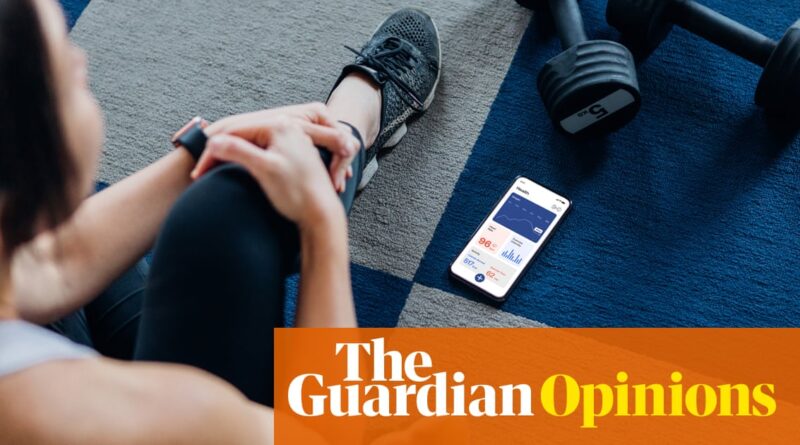I joined a group of people who follow their fitness adventures on social media. Don’t hate me Anna Spargo-Ryan
A A recent report sent by Lululemon – an activewear brand known for its current founder’s hatred of fat people – suggests that “the constant pressure to improve our well-being is actually making us less healthy “. Its 2024 Global Wellbeing report finds that almost two-thirds of Australians struggle with social needs to maintain good health “in some way”. It says that nearly half of us feel pressured to pretend we’re happy when we’re not.
It feels like we have about a zillion reasons to feel like crap, and some have suggested that social media is to blame. Fitness is represented online by staged, well-lit selfies, endless Strava updates and edited videos of perfect squats. But for me, in a world where everything goes to hell, there is joy to be found in them.
It wasn’t always this way. Like many people born in the 1980s – especially women – I was taught that exercise was not for me. PE class was in hell. Even when we did something I loved, my body was wrong or I had BO or my period. Sports were for other people. When I was 30 years old, the idea of choose participating in sports was a joke and “healthy” looked like giving my children to someone else so I could go to the spa.
Sometimes I would see posts from friends about their exercise routines. Often, I thought, “That’s particularly offensive.” There was no reason, in my mind, to join the gym unless it made me feel bad about not exercising. Horrified by their hate crime (posting statistics since they ran), I unfollowed them and went back to the job I love (I feel bad).
It’s hard to explain how determined I am to not go to the gym I used to. There were days when my phone registered less than 100 steps. But one day I was struggling to get off the floor after pulling out the remote and suddenly I realized, I’m almost 40 years old .I thought, maybe I should make any move.
I was taught to fear the gym. I thought I was being openly mocked by ripped teenagers in provocative outfits. Maybe they would write my terrible efforts and disgusting body for the news. I was going home, logged in and found that I tried to do one RDL when I was middle aged.
Because I had changed into something other than my underwear, social media algorithms didn’t show me any health issues. I found videos of cats falling off benches and 38 ways to cook potatoes. If I compared myself to anyone, it was people who have enough money to try every single snack at Costco.
Social media wasn’t stopping me from exercising. It was my fear, guilt and imagination.
I was too embarrassed to try in public, so I turned to YouTube. Ignoring its suggestion of “Is it an H bomb or a cake?” I typed in “home workouts” and off I went. I only practiced briefly. The algorithm immediately decided that I should do more workouts. All my diet was full of gyms.
It wasn’t like what I thought. People of all walks, shapes and passions have made fitness content. I flowed with sweat, tears, success, failure. I saw shorts and women lifting 100kg over their heads and people doing yoga with their dogs. I watched a woman who could run for 24 hours straight and a man whose goal was to stand up straight for a full minute.
The message had changed a lot since my 10th PE class: there were all kinds of ways to move and feel good. I was sold. I could go to the gym if I was a sweaty, red-faced uncoordinated monster. So I did that. The people I met were mostly like me: enthusiastic, centered and happy to be there. I tried weightlifting, running, boxing, pilates. Every time I went, I shared my little Garmin chart on my Insta stories. Sometimes, the guy answering would cause the fire to respond. I was proud. Most importantly, my health improved dramatically, it improved rapidly.
Lululemon’s report urges us to “release the stress of being healthy and focus on our journey”. But it also records the extreme loneliness that many of us feel. It cites social connection as enhancing our sense of purpose. If, as it suggests, the 21% of people who “feel a sense of belonging when working with other people” also report higher health, perhaps it’s not a sharing problem.
It’s easy to point to social media and call it “stress”, and for some people it can be. But it can also be a source of connection. We are trying to reach Peak Wellbeing in the face of some of the greatest mistakes in history, seeking balance in the midst of the cost of living, genocide, isolation and crisis. of weather. My younger self might have seen what Paula wrote about her half marathon training and thought it was insulting. But now I think: what a myth. Maybe the stories of our friends are interesting. Or, perhaps, it’s easier to blame than the invisible everyday damage.
The truth is that very few people go to the gym thinking about someone else. Almost no one takes a fake exercise selfie. They never posted Strava to offend others. The vast majority of health posters are not fitspo influencers. It’s just people going, “Hey, check it out. I tried my best, despite everything.”
#joined #group #people #follow #fitness #adventures #social #media #Dont #hate #Anna #SpargoRyan

